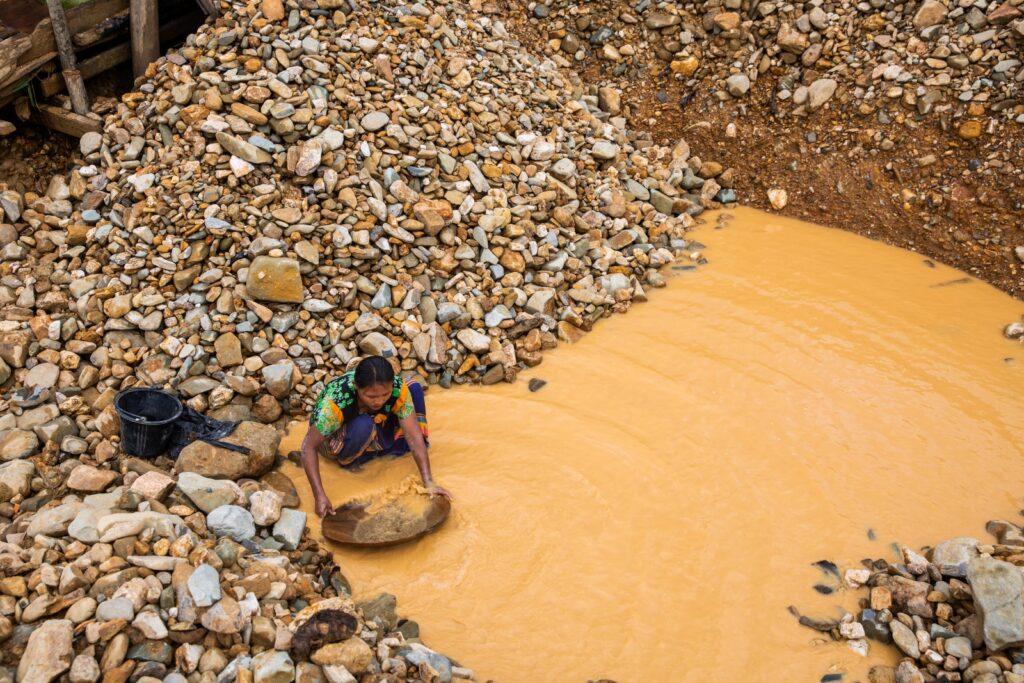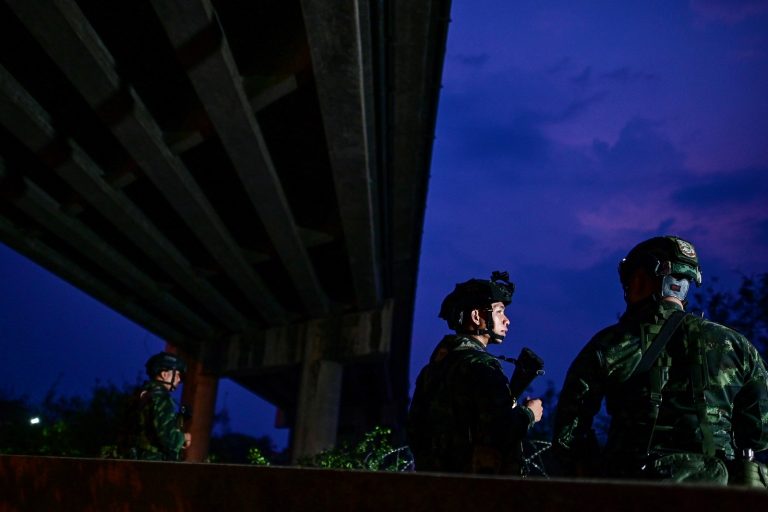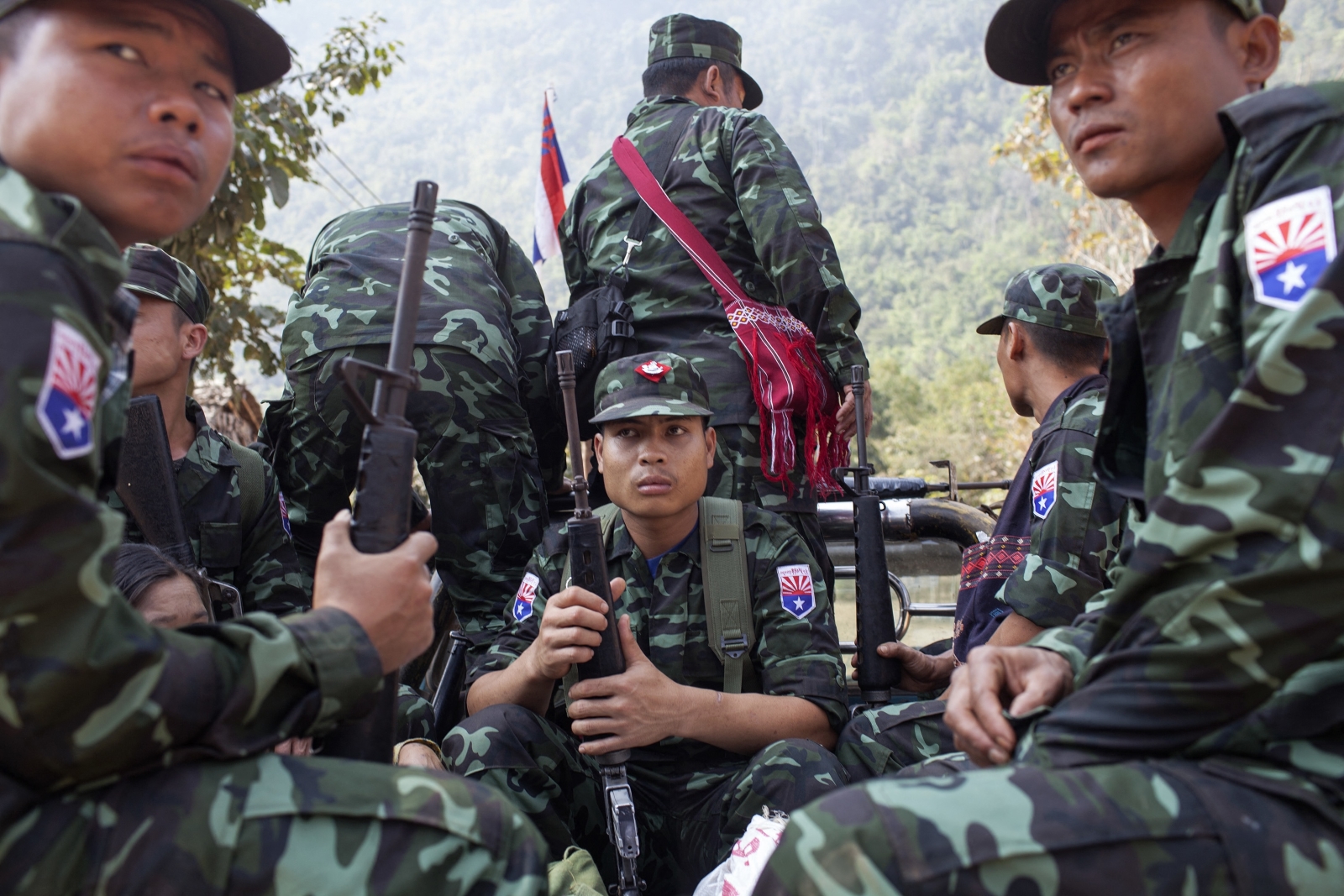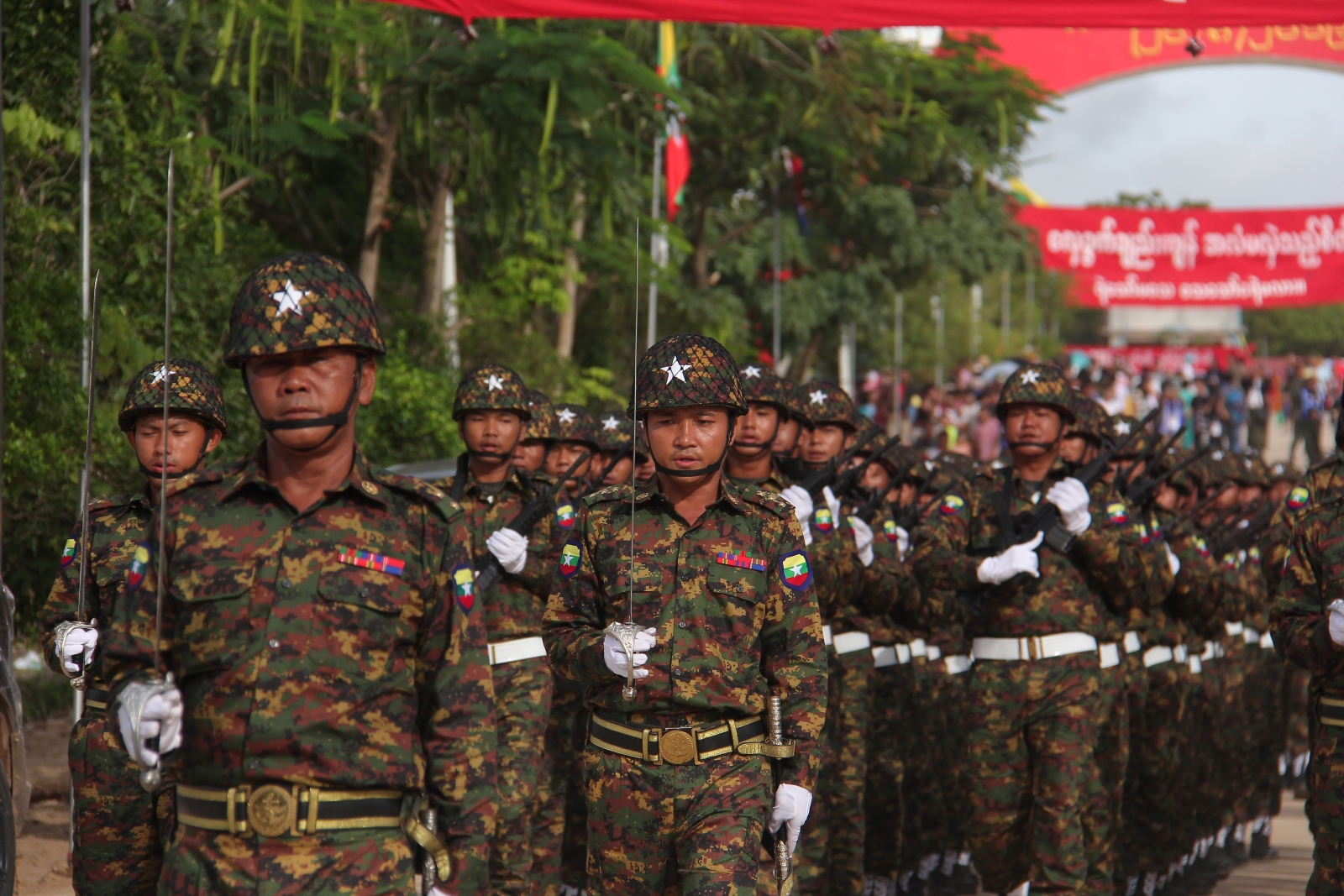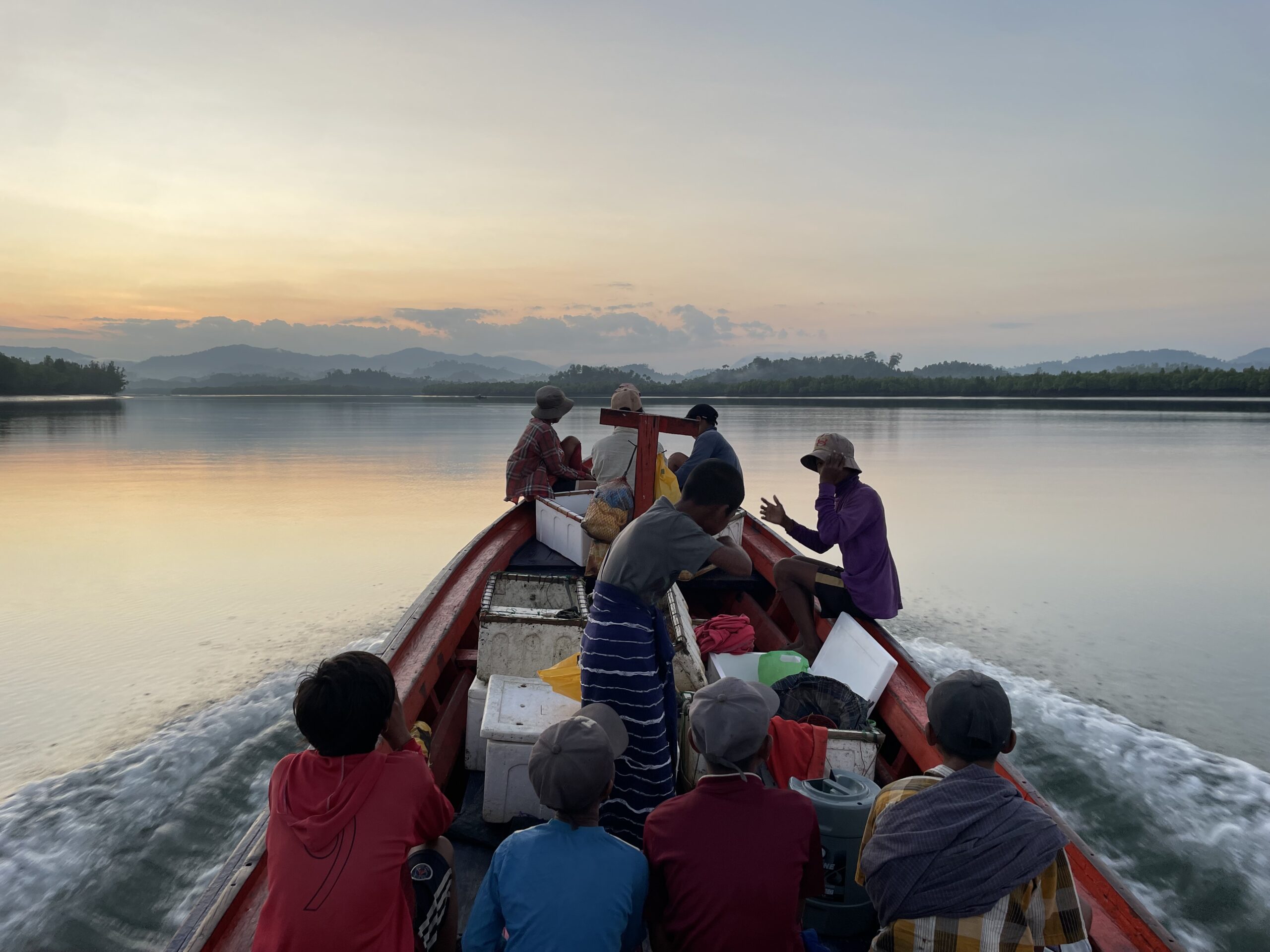Mines are being dug across Tanintharyi Region amid a collapse in environmental regulation and the chaos of armed conflict, with minerals exported to Thailand and China.
By HEIN THAR | FRONTIER
The people of Thaboleik have long wanted a football field, but it’s impossible to find a plot big enough because lead mines have turned the village into a landscape of craters.
Located near the border with Thailand, in Myanmar’s southernmost region of Tanintharyi, Thaboleik used to be a sleepy place. Like in many other villages of Tanintharyi Township, its residents mostly made a living harvesting betel nuts from palm groves. But 10 years ago, lead was discovered in the area.
Frontier visited Thaboleik in October and saw how mining was encroaching on the settlement and eating into the nearby forest. According to residents, the mines now occupy about four-fifths of the land surrounding the village, which is permanently covered in dust.
Lead mining has attracted more residents, including migrant labourers from outside the region and prospectors looking to dig fresh pits. The village’s population has swelled from about 800 to 2,000 people, making it one of the biggest settlements in the township.
But villagers complain that Thaboleik’s mining wealth has been concentrated in few hands.
“There are farmers who became rich all of a sudden when lead was found in their lands. But while some villagers have gotten wealthy, the village is still poor. There isn’t even a football field here,” said U Pu*, a 47-year-old resident of Thaboleik.
Tanintharyi is well-known for the minerals beneath its soil – especially lead, tin and tungsten, but also platinum and gold – extracted by companies who strike deals with whoever rules the area.
The authority in Thaboleik is the Karen National Union’s Brigade 4. The group seized the village from the junta in May last year in a joint assault with the Tanintharyi People’s Defence Force, which was formed to fight the 2021 military coup.
The KNU usually only takes authority over ethnic Karen villages, but Thaboleik’s population is mostly Bamar. However, the lucrative lead deposits compelled it to make an exception and claim the village, in place of the Bamar-lead Tanintharyi PDF.
PDF members said they felt short-changed but were powerless to protest, because they depend on the more powerful Karen armed group for weapons, training and leadership in larger operations.
“The KNU is like a father and we’re like their sons. We don’t dare to complain because we don’t want any rifts with them,” a member of the PDF told Frontier on the condition of anonymity.
KNU Brigade 4 did not respond to Frontier’s requests for comment.

‘All the streams have been destroyed’
On seizing Thaboleik last year, the group expelled Wai Myanmar, the main company operating in the village since 2016, on the grounds that it was linked to the military. As a result, the mining in the village is now done by a mix of mostly small operators.
The KNU appointed a committee of villagers to regulate these operators, who must pay an initial fee of up to K30 million (US$8,600 at the market rate) per acre of land.
When Frontier arrived, the committee was being reassembled after some members were accused of embezzlement and fled. But besides this alleged corruption, the committee has failed to enforce basic environmental safeguards.
One of the main problems is miners ignoring the rule that pits be filled with dirt once operations are done. Consequently, Thaboleik’s surroundings are pocked with small pools of contaminated water, which overflow into the village during the rainy season.
“Nobody is refilling those holes right now. They just leave them in the ground and move on,” U Pu complained.
The churning of the landscape has also blocked or polluted the village’s waterways, forcing residents to fetch water from a mountain stream more than a mile away and rely on deliveries by a drinking water company.
“There used to be a stream here when I was a child,” U Pu said, pointing at a mining site just outside the village. “But now all the streams have been destroyed and it’s become impossible to fish in the area.”
Besides damaging the local environment, the mines are also hazardous places to work. In April last year, a landslide at a mining site in Thaboleik killed three men, one woman and a child, whom volunteer rescue workers identified as being migrant workers and attendant family members.
‘No law enforcement’
Tanintharyi’s rich mineral reserves have been mined on an industrial scale since the British colonial era, and mining expanded when foreign firms, particularly from Thailand, entered the region in the 1990s and exported the metals to Thailand, China and Malaysia. Operations like the Heinda tin mine, in rural Dawei Township, have devastated communities, destroying farms and plantations and contaminating the water supply, while local efforts to seek redress have largely gone nowhere.
The pre-coup National League for Democracy-run regional government said in 2017 that it would not grant new mining concessions and would review legacy projects for environmental compliance. However, polluting mines like Heinda were later allowed to continue despite opposition from communities.

But the situation seems to have worsened since the 2021 coup, when the country was plunged into chaos and the enforcement of environmental regulations, weak as it was, largely disappeared. Tanintharyi-based news outlet Dawei Watch reported that the Tanintharyi Nature Reserve, in Yebyu and Dawei townships, is being eaten away by illegal gold mines, undoing decades of conservation work.
“Some of the mine sites, especially the big ones, are under military control, while some of them are exploited by the resistance. And I’m sure there are many new sites in areas we know nothing about,” said U Moe*, a mining investor and member of the Tanintharyi Region Chamber of Commerce and Industry.
“What they all have in common is that they’re not following any environmental guidelines, because there’s no law enforcement,” he told Frontier.
‘They want to do big business’
Cultivating the betel, also known as the areca, nut used to be one of the main livelihoods in Tanintharyi. But the industry was undermined when the biggest export destination, India, imposed prohibitive tariffs on shipments of the nut from 2017 and cracked down on the resulting surge in smuggling.
“The betel nut business is dying and it won’t be restored anytime soon because there’s no exports,” a businessman in Myeik Township said, asking to remain anonymous.
Many people are therefore turning to mining, where the proceeds are high. Miners in Thaboleik told Frontier one viss (1.68kg) of lead could sell for K60,000 ($17 at the market exchange rate) to foreign buyers.
“There’s no exact data for lead exports at the moment, but China and Thailand are buying as much as they can,” said U Moe.
Business is often conducted through Facebook groups that put mine owners, agents and buyers in touch and often feature offers for mining sites. “You can get as many mining sites as you want around the border between Tanintharyi and Mon [State],” an agent posted in one of the groups.
Frontier contacted the agent posing as a potential investor from Thailand, enquiring about the availability and security of mining locations. He explained there were sites available near Kaleinaung town in Yebyu Township, in an area controlled by the junta-aligned Kayin State Border Guard Force.
“They [the BGF] don’t want small projects; they want to do big business. Don’t worry about stability in the area – your business is safe so long as the BGF’s there,” he said on the phone.
Meanwhile, in Thaboleik, residents worry the village may not survive the mining.
“Fish can no longer live in the [streams and ponds] because of the pollution,” U Pu said, “but soon it’ll be the people who abandon the village.”
* indicates the use of a pseudonym for security reasons


